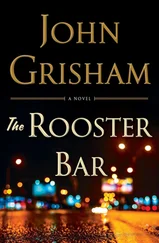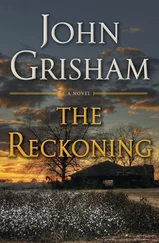“Look, I met June years after the murder. In fact, she had another husband before she met me. I’m number three, you understand? I know she had a rough time when she was younger but our life is pretty good right now. The last thing she wants is any trouble related to Quincy Miller.”
“I’m asking for help, Otis. That’s all. We got a brother wasting away in prison not two hours from here. The white cops and white prosecutor and white jury said he killed a white lawyer. Didn’t happen that way.”
Otis spits, leans on his door, and crosses his arms over his chest.
Frankie gently presses on. “Look, I served fourteen years in Georgia for somebody else’s murder. I know what it’s like, okay? I got lucky and got out, but I left some innocent guys behind. Guys like me and you. There’s a lot of us in prison. The system’s rigged against us, Otis. We’re only trying to help Quincy.”
“So what’s June got to do with this?”
“Has she ever told you about the flashlight?”
Otis thinks for a second and shakes his head. Frankie doesn’t want a gap in the conversation. “There was a flashlight with some blood on it. Cops said it came from the crime scene. Quincy never saw it, never touched it. June told the jury he had one very similar to it. Not true, Otis. Not true. She also told the jury that Quincy was somewhere around Seabrook the night of the killing. Not true. He was with a girlfriend an hour away.”
Otis has been married to June for seventeen years. Frankie is assuming he is quite aware of her struggles with the truth, so why beat around the bush?
“You’re calling her a liar?” Otis said.
“No, not now. But you said yourself she was a different woman back then. She and Quincy were at war. He owed her a bunch of money that he couldn’t pay. The cops leaned on her to take the stand and point the finger.”
“A long time ago, man.”
“Damned right. Ask Quincy about it. He’s spent twenty-two years in prison.”
“Well, let’s say she didn’t tell the truth back then. You expect her to admit it now? Come on.”
“I just want to talk to her. I know where she works. I could’ve gone there, but we don’t operate that way. This is not an ambush, Otis. I respect your privacy and I’m asking you to run it by June. That’s all.”
“Feels like an ambush.”
“What else could I do? Send an e-mail? Look, I’m leaving town. You talk to her and see what she says.”
“I know what she’ll say. She ain’t got nothing to do with Quincy Miller.”
“I’m afraid she does.” Frankie hands him a Guardian Ministries business card. “Here’s my phone number. I’m just asking for a favor, Otis.”
Otis takes it and reads the front and back. “You with some kinda church?”
“No. The guy who runs it is the lawyer who got me out of prison. He’s a preacher too. Good guy. This is all he does, gets innocent folk out.”
“White guy?”
“Yep.”
“Must be a bad dude.”
“You’d like him. So would June. Give us a chance, Otis.”
“Don’t bet on it.”
“Thanks for your time.”
“Don’t mention it.”
8
At Guardian, we have a collection of brochures we use for a variety of purposes. If our target is a white guy, I use the one with my smiling face front and center. With the collar. If we need to approach a white woman, we’ll use Vicki’s. Blacks get the one with Mazy arm-in-arm with a black exoneree. We like to say that skin color doesn’t matter, but that’s not always true. We often use it to open doors.
Since Zeke Huffey is white, I sent him my brochure with a chatty letter informing him that his plight has come to the attention of our little foundation and we’re reaching out. Two weeks later, I received a handwritten letter on ruled notebook paper thanking me for my interest. I responded with my usual follow-up and asked if he needed anything. Not surprisingly, his next letter asked for money. I sent him a $200 MoneyGram with another letter asking if it’s okay to visit him. Of course it’s okay.
Zeke is a career criminal who has done time in three states. He is originally from the Tampa area but we have found no trace of his family. When he was twenty-five he married a woman who quickly divorced him when he was convicted of drug trafficking. As far as we know, he has no children, and we’re assuming his visitors are scarce. Three years ago he got busted in Little Rock, Arkansas, and is currently doing five years in the Land of Opportunity.
His career as a snitch began with the trial of Quincy Miller. He was eighteen when he testified, and a month after the trial his drug charges were reduced and he walked. That deal worked so beautifully that he did it again and again. Every jail has a druggie facing more time and eager to avoid it. With the proper coaching from cops and prosecutors, a snitch can be quite effective with his perjury. Jurors simply cannot believe that a witness, any witness, will take the oath, swear to tell the truth, then tell them an outlandish story of pure fiction.
These days Zeke is doing time at a satellite prison in the middle of the cotton fields of northeastern Arkansas. I’m not sure why it is referred to as a satellite. It’s a prison, with all the usual dreary architecture and fencing. Unfortunately, the facility is operated for profit by an out-of-state corporation, which means the guards earn even less and there are fewer of them, the terrible food is even worse, the commissary gouges the men on everything from peanut butter to toilet paper, and the medical care is almost nonexistent. I suppose that in America everything, including education and corrections, is fair game for profiteers.
I am led to a room with a row of enclosed booths for ATTORNEY VISITS. A guard locks me inside. I take a seat and stare at a thick plastic divider. Minutes pass, then half an hour, but I’m in no hurry. The door on the other side opens and Zeke Huffey steps in. He offers me a smile as the guard removes the handcuffs. When we’re alone he says, “Why are we in a lawyer’s room?” He’s looking at my collar.
“Nice to meet you, Zeke. Thanks for taking the time.”
“Oh, I got plenty of time. Didn’t know you were a lawyer.”
“I’m a lawyer and a priest. How are they treating you here?”
He laughs and lights a cigarette. Of course the room has no ventilation. “I’ve seen my share of prisons and this has to be the worst,” he says. “Owned by the state but leased to an outfit called Atlantic Corrections Corporation. Ever heard of them?”
“Yes. I’ve been a guest in several of their units. Seriously bad stuff, right?”
“Four bucks for a roll of toilet paper. Should be a dollar. They give us one roll per week, sandpaper that makes you limp when you walk. I guess I’m lucky you sent me that money. Thank you, Mr. Post. Some of my buddies never see a dime from the outside.”
Hideous prison tattoos are crawling up his neck. His eyes and cheeks are sunken, the look of a street addict who’s been stoned on cheap drugs for most of his life.
I say, “I’ll send some more money when I can, but we operate on a pretty lean budget.”
“Who is ‘we’ and why are you really here? A lawyer ain’t gonna help me.”
“I work for a nonprofit foundation dedicated to saving innocent men. One of our clients is Quincy Miller. Remember him?”
He chuckles and releases a cloud of smoke. “So you’re here under false pretenses, huh?”
“You want me to leave?”
“Depends on what you want.” As a career criminal, Zeke knows that the game has suddenly changed. I want something that only he possesses, and he’s already thinking about how to capitalize. He has played this game before.
I say, “Let’s start with the truth.”
Читать дальше












